
William-Adolphe Bouguereau La naissance de Vénus 1879

We passed 20 million cases, another sad milestone. But both new cases and new deaths are quite low. With US new cases below 50,000, and deaths at “only” 534, overall not a bad weekend, in the grand scheme of things.

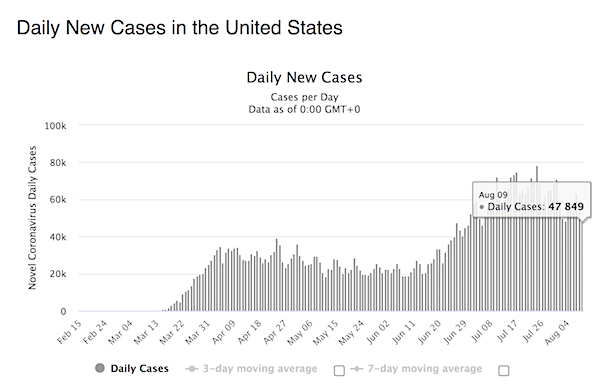

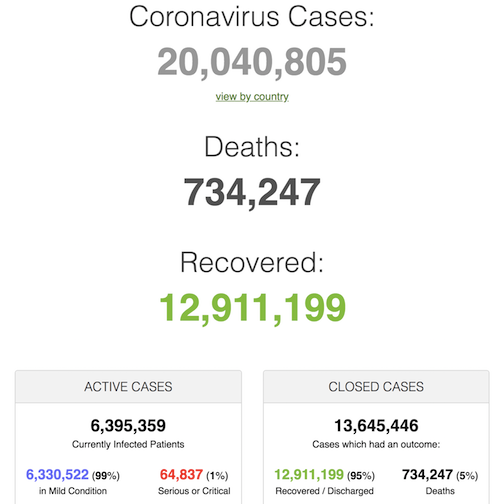

Pelosi
https://twitter.com/greg_price11/status/1292647384124661767
Aaron Maté Russiagate Monsters under the bed
If you’re wondering what a discussion of “Russian interference in the 2020 election” is, it’s like kids fearing a monster under the bed except also blaming that monster for them not winning the 2016 election. https://t.co/bpnyDFsGLY
— Aaron Maté (@aaronjmate) August 10, 2020

If you read just one thing today, try this. From Matt Taibbi’s substack.
“As a doctoral candidate at Cambridge working under “FBI Informant” Stefan Halper, I had a front-row seat for Russiagate..”
• The Spies Who Hijacked America (Schrage)
Global scandals now labeled Russiagate, Spygate, and what President Trump calls “Obamagate” shook the political world, but hit me closer to home. I’m the reason the so-called FBI “spy” at the center of Spygate, Stefan Halper, met Carter Page, the alleged “Russian Asset” in Russiagate’s Crossfire Hurricane investigation. On May 19, 2018, this realization blindsided me in London as I was about to fly out for my wedding. The New York Times, NBC News and other sources had outed my PhD supervisor, Stefan Halper, as a spy known to the UK’s MI6 intelligence service as “The Walrus.” It didn’t seem real. Could a former professor I once trusted as a mentor have betrayed his word, profession, and country to start these disasters?
I had moved to England to pursue an academic career and leave DC’s politics behind, only to have my PhD supervisor throw me back into the most outrageous political firestorms I could imagine. Just my luck. Then an even worse question began nagging at me. Did I unintentionally light the match that started it all? As I started to piece together what happened over the next few months, I realized something. The stories that The New York Times, Washington Post, and others were pushing didn’t add up. Many seemed planted to cover up or advance the agendas of several individuals whose tentacles secretly ran through these scandals, and who each had longstanding ties to intelligence services like the FBI, CIA, and MI6. I call these individuals the Cambridge Four.
Strangely, all four were linked through that sleepy British academic town thousands of miles from the alleged “ground zeroes” of Russiagate’s conspiracies, Moscow and DC. In addition to the central “Spygate” figure Halper, they include the central source of “Russiagate’s” fake conspiracy theories, Christopher Steele; former MI6 Director Sir Richard Dearlove; and Halper’s and Dearlove’s partner in a Cambridge Intelligence Seminar linked to titillating — but false — tales of a “Russian spy” seducing Trump’s top national security advisor. My years of work with Halper provided an inside view of how their four networks interconnected. The more I dug up new pieces of this puzzle, the more I saw how these individuals’ seemingly separate acts might fit together in an absurd picture of how these scandals really started.
Armed with first-hand knowledge and evidence, I quietly sought to help federal investigators uncover these scandals’ mysteries. It wasn’t my first rodeo. After witnessing the plane that hit the Pentagon on 9/11, I led G8 and State Department international crime and terrorism efforts with Department of Justice (DOJ), FBI, and intelligence officials and had worked for decades in White House, Congressional, and presidential campaign roles. This helped me keep a stiff upper lip when I was falsely accused in 2019 by the House Intelligence Committee’s Ranking Republican and others on television as being part of a secret anti-Trump cabal. As much as I wanted to defend myself, I knew our best shot of exposing the real forces behind these scandals was for me to remain publicly silent and not let those under investigation know what I knew or was willing to say.

MAY have?
• Memo Shows FBI May Have Misled Senate About Russia Probe (JTN)
The Senate Judiciary Committee on Sunday released a document it says shows the FBI misled senators on the Intelligence Committee during the Russia probe by falsely suggesting Christopher Steele’s dossier was backed up by one of his key sources. “Somebody needs to go to jail for this,” Sen. Lindsey Graham, R-S.C., the panel’s chairman, told the Fox News program Sunday Futures with Maria Bartiromo. “This is a second lie. This is a second crime. They lied to the FISA court. They got rebuked, the FBI did, in 2019 by the FISA court, putting in doubt all FISA applications. “A year before, they’re lying to the Senate Intel Committee. It’s just amazing the compounding of the lies,” Graham added.
The document in question contains the draft talking points the FBI used to brief the Senate Intelligence Committee in February 2018, including an assessment that the primary sub-source of the information contained in the Steele dossier had backed up the former MI-6 agent’s reporting. The primary sub-source “did not cite any significant concerns with the way his reporting was characterized in the dossier to the extent he could identify it,” the FBI memo claimed. “…At minimum, our discussions with [the Primary Sub-source] confirm that the dossier was not fabricated by Steele.” In fact, by the time the FBI provided senators the briefing, agents had already interviewed Steele’s primary sub-source who disavowed much of what was attributed to him in the dossier as in “jest” or containing uncorroborated allegations.
Agents also had been warned by the CIA that Steele’s memos contained disinformation fed to him by Russian intelligence services, and had created a spreadsheet showing most of the claims in the dossier were either debunked, unable to be corroborated or Internet rumor. Graham said the document is so misleading he is demanding FBI Director Chris Wray identify the names of those involved in the briefing. “They misled the hell out of them,” he said. There is widespread evidence released by the Judiciary Committee and the DOJ inspector general contradicting the February 2018 FBI briefing memo including that the primary sub-source:
• told the FBI that he “has no idea” where some of the language attributed to him came from or that his contacts and “never mentioned” some information attributed to him.
• told the FBI he “did not know the origins” or “did not recall” other information contained in the dossier that was supposedly from his contacts
• alleged that Steele used “incorrect source characterization” for one of his contacts. told the FBI that the corroboration for the dossier was “zero” and that he takes what the sources for the dossier told him with “a grain of salt.”
• claimed much of what he told Steele was second-hand or even in jest and never intended it to be treated as intelligence because if was “word of mouth and hearsay” and “conversation that [he] had with friends over beers.”

Pelosi tried to be a leader and failed. Now she’s a follower. Does that about sum it up?
• Pelosi, Mnuchin Open Door To Narrower COVID19 Aid Through 2020 (R.)
U.S. House Speaker Nancy Pelosi and Treasury Secretary Steven Mnuchin on Sunday said they were open to restarting COVID-19 aid talks, after weeks of failed negotiations prompted President Donald Trump to take executive actions that Democrats argued would do little to ease Americans’ financial distress. Discussions over a fifth bill to address the impact of the coronavirus pandemic fell apart on Friday, a week after the expiration of a critical boost in unemployment assistance and eviction protections, exposing people to a wave of economic pain as infections continue to rise across the country.
Trump on Saturday sought to take matters into his own hands, signing executive orders and memorandums aimed at unemployment benefits, evictions, student loans and payroll taxes. Trump told reporters in New Jersey before returning to Washington on Sunday that his suspension of the collection of the payroll tax could be made permanent. He said doing so would have no impact on Social Security because reimbursement would be made through the general fund. Trump, noting that Democrats want to resume stimulus discussions, said the White House would be willing to talk to them again “if it’s not a waste of time.”
On Sunday, both Pelosi and Mnuchin appeared willing to consider a narrower deal that would extend some aid until the end of the year, and then revisit the need for more federal assistance in January. That would come after November’s election, which could rebalance power in Washington. “Let’s pass legislation on things that we agree on,” Mnuchin told Fox News in an interview. “We don’t have to get everything done at once. … What we should do is get things done for the American public now, come back for another bill afterwards.”
DDMB Out of work
Great chart by @biancoresearch w/data via @uscensusbureau Household Pulse Survey. About 35% of American households expect a loss of employment in the next four weeks. With the percentage of unemployed out of week >15 weeks at 48.8%, the conventional portion of recession has begun pic.twitter.com/OizuXW1yuC
— Danielle DiMartino Booth (@DiMartinoBooth) August 9, 2020

Protect small businesses? Half of them are gone forever. Protect the people instead.
• Fed’s Evans Says Another Coronavirus Aid Package ‘Incredibly Important’ (R.)
The United States should implement another support package to ensure workers can stay safely at home while the novel coronavirus continues to spread, Chicago Fed President Charles Evans said in an interview with CBS News released on Sunday. Evans said it was up to U.S. lawmakers to protect small businesses and vulnerable communities with measures that ensure they can continue to pay their rent and buy food as long as the virus was not under control. “I think that public confidence is really important and another support package is really incredibly important,” Evans said on CBS’s Face the Nation program.
He also said that the most pessimistic economic projections involved not supporting state and local governments, which in turn would have to implement drastic cuts to support some of the federal aid measures. Evans’ comments come after U.S. lawmakers failed to strike an agreement on a second aid package after weeks of negotiations, leaving tens of millions of unemployed Americans without direct federal support.

And you would expect to see that reflected in the USD’s exchange rate. But not yet.
• The US Economy Is Stronger Than the Eurozone’s (Lacalle)
The United States is showing resiliency and strength compared with other leading economies worldwide. The impact of the covid-19 forced shutdown crisis is lower in the United States than in Japan, Germany, France, the average of the European Union 27, and the euro area countries. The recovery is also stronger and more sustainable. This does not mean that the economic impact is small. Recession is severe and its impact on jobs and growth cannot be underestimated, but it is important to show how other economies with larger government spending plans and important entitlement programs are showing a much weaker performance. The second quarter GDP was much better than in the euro area (–9.5 percent quarterly compared to –12.1 percent in the eurozone), although it reflects a notable quarterly drop, and well below the one seen in 2008.
This comparison is important because most mainstream economists believe that higher government spending and public sector help offset the blow of a recession. They do not. The United States quarterly GDP fall, at –9.5 percent, is small compared to Germany’s –10.1 percent, France’s –13.8 percent, Italy’s –12.4 percent, Spain’s –18.5 percent and the European Union 27’s at –11.9 percent. You may have read about the quarterly annualized –32.9 percent figure for the United States, but it is misleading to compare it with the European published figures, which are not annualized. The annualized rate estimates how much the economy would grow or shrink if the rate of change seen in the quarter continued for four consecutive quarters.
If we compared apples to apples, the quarterly annualized GDP collapse would be from –40 percent in Germany to –55 percent in Spain compared to the US’s –32.9 percent. In any case, it seems relevant to insist on three points: 1) the United States GDP decline was smaller than consensus estimates; 2) it is notably lower than the eurozone figure, which was worse than consensus expected; and 3) the advanced US data points to one of the strongest recoveries in the world. The improvement in domestic demand that we already began to observe in the month of May has been confirmed in June. Retail sales registered an increase of 7.5 percent per month, the second-highest number in the historical series after the May data, and this time with a less relevant “base effect.” In year-on-year terms, retail sales have already grown 1.1 percent and, eliminating vehicle sales, this increase amounts to 7.3 percent year on year. Still a lot to improve, though.
Advanced and leading indicators in the United States point to a third quarter GDP rise of 18 to 20 percent in annualized terms, a recovery of more than half of the decline in first half of the year in three months. There is a lot to do and no one can be complacent. If consumption and investment progress within potential, the US economy could close the year at flat growth and 6 percent unemployment in the most optimistic scenario. However, it is more likely that the economy will end the year down 5 percent and with unemployment at 8.5 percent, all according to our estimates. This compares with a eurozone that may likely fall more than 9 percent in 2020, with official unemployment and furloughed jobs reaching an average of 12.5 percent according to Bloomberg.

Cullusion with foreign forces. It’s like the US. And now they can take him to China under the new law?!
• Hong Kong Media Tycoon, Pro-Democracy Leader Arrested In New Crackdown (JTN)
Jimmy Lai, a prominent publisher and pro-democracy leader in Hong Kong, was arrested Monday on charges of foreign collusion under a new national security law sharply criticized by the United States. The 71-year-old founder of the Apple Daily outlet and a longtime antagonist of communist China was taken in custody as police raided his newsroom seeking documents. Lai was already facing other charges related to his organization of protests last year, but the new counts sent shockwaves through Hong Kong. Lai’s arrest was part of a larger police operation. Hong Kong law enforcement officials said at least seven people aged 39 to 72 had been arrested on suspicion of collusion with foreign forces against national security, and conspiracy to commit fraud.

Twitter thread from Deficit Owl h/t Steve Keen. I’ve said it before: we must have these discussions.
• Should The Government Balance Its Budget? (DO)
One popular idea in “Keynesian economics” is that the government should balance its budget over the course of the business cycle, running deficits for stimulus during recessions, then surpluses in booms to bring down the debt. This is a bad strategy, because it neglects the interconnectedness of financial positions in the economy. One entity’s spending is another’s income; so for somebody to run a surplus, somebody else has to run a deficit. So if we say “gov should run a surplus,” what does that imply about private financial positions? In the US, because of structural factors that aren’t going away anytime soon, we nearly always run deficits against the rest of the world (the trade/current account deficit), meaning that we send income overseas that doesn’t come back as spending.
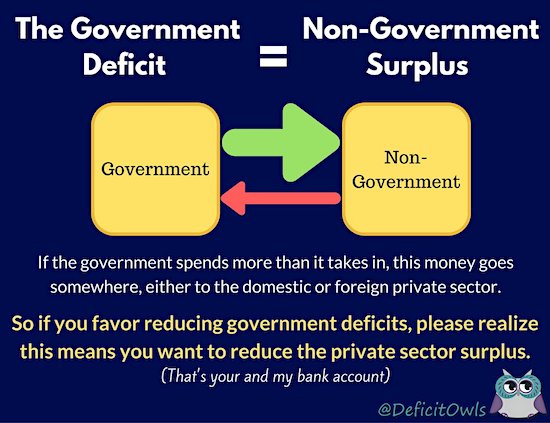
That means that for the US private sector balance to be positive (a surplus), the gov sector balance has to be negative (a deficit) and it has to be at least as large as the losses to the foreign sector (the gov deficit ≥ the current account deficit). The private sector doesn’t need to be in surplus at all times. But we also wouldn’t expect it to be continually in deficit – that would imply, on net, ever-worsening financial positions in the private sector, running down saved assets and/or issuing new IOUs. So what happens to the private sector if the gov “balances its budget over the cycle”? In recessions, depending on the size of the gov deficit, the private sector will be balanced or running small surpluses (because the foreign deficit cancels out some/all of the gov deficit). But in booms, the private sector would be deeply in the red (deficit), because the gov surpluses would be subtracting income out of the private sector, while the foreign sector is doing it too. /7
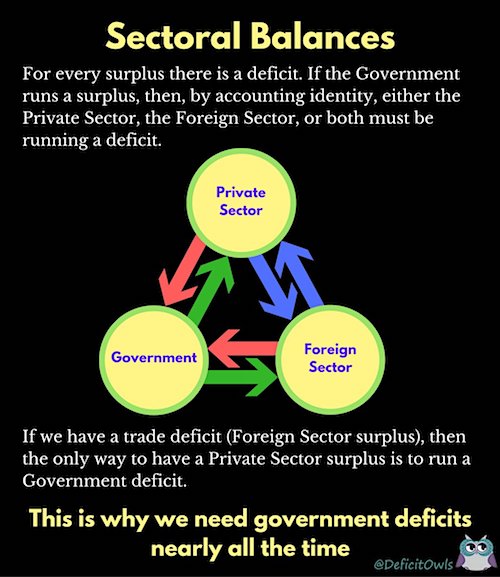

This discussion is far from over.
• One-Fifth Of All Mail-in Ballots Disqualified In NYC Primary (JTN)
Tens of thousands of mail-in voting ballots in the recent New York Democratic presidential primary election were disqualified without being counted — a sign that the country’s looming presidential election, one which may be conducted significantly by mail, could be facing procedural chaos over countless disputed and uncounted votes. A total of more than 84,000 ballots were disqualified in the city primary — roughly 21%, or one out of every five votes — many of them due to late submissions, lack of postmarks and missing signatures. Kings County — the borough of Brooklyn — alone saw 30,000 ballots invalidated. The disorganized voting and tallying process could signal a coming crisis in November, when much of the American vote is expected to be submitted via mail due to fears of the coronavirus.
A Pew Research Center Poll from June found that just one out of every five Americans voted by mail in the 2016 election; many officials across the country have been pushing in recent months for every American voter to receive a mail-in ballot. President Trump has of late warned repeatedly that the mail-in voting process is ripe for fraud and abuse, yet the disarray of New York’s primary suggests procedural issues may form a much larger concern for election integrity in November. A localized ruling by a federal judge last week has thrown the New York primary into even greater disorder. Judge Analisa Torres ruled Aug. 3 that, due to faulty mailing and processing issues, all mail-in votes in the state received up to two days after the election must be counted so long as they were postmarked by the day of the election.
Torres extended that order to cover all elections across the state, claiming that not doing so “would risk running afoul of the Constitution’s guarantee of equal treatment.” State Board of Elections spokesman John Conklin told Just the News that Torres’ ruling has not yet been enforced. “The State Board of Elections is appealing the decision,” he said via email. “If we lose the appeal then all affected boards will have to conduct additional canvassing for absentee ballots received on June 24th and 25th without a postmark. The local boards would then submit amended certifications of their primary results.”
“It is not expected that the outcome in any contest will be changed,” Conklin added. “Absentee ballots can be disqualified for any number of statutory reasons,” he added, including “late postmark, no postmark, the Oath envelope not signed and dated by the voter, the signature on the Oath envelope does not match the signature in the voter’s registration record, the Oath envelope not sealed by the voter, the voter is deceased, the voter showed up in person to vote on Election Day,” and numerous other factors.

There was zero need to drop it, or the Hiroshima bomb. Japan had been looking for a way to surrender for months. But Russia also declared war on Japan, and that changed things.
• The Very Un-Christian Nagasaki Bomb (Kohls)
Seventy-five years ago today, an all-Christian bomber crew dropped “Fat Man,” a plutonium bomb, on Nagasaki, Japan, instantly annihilating tens of thousands of innocent civilians, a disproportionate number of them Japanese Christians, and wounding uncountable numbers of others. For targeting purposes, the bombing crew used St. Mary’s Urakami Cathedral, the largest Christian church in East Asia. At 11:02 a.m., on Aug. 9, 1945, when the bomb was dropped over the cathedral, Nagasaki was the most Christian city in Japan. At the time, the United States was arguably the most Christian nation in the world (that is, if you can label as Christian a nation whose churches overwhelmingly have failed to sincerely teach or adhere to the peaceful ethics of Jesus as taught in the Sermon on the Mount).
The baptized and confirmed Christian airmen, following their wartime orders to the letter, did their job efficiently, and they accomplished the mission with military pride, albeit with a number of near-fatal glitches. Most Americans in 1945 would have done exactly the same if they had been in the shoes of the Bock’s Car crew, and there would have been very little mental anguish later if they had also been treated as heroes. Nevertheless, the use of that monstrous weapon of mass destruction to destroy a mainly civilian city like Nagasaki was an international war crime and a crime against humanity as defined later by the Nuremberg Tribunal. Of course, there was no way that the crew members could have known that at the time. Some of the crew did admit that they had had some doubts about what they had participated in when the bomb actually detonated.
Of course, none of them actually saw the horrific suffering of the victims up close and personal. “Orders are orders” and, in wartime, disobedience can be, and has been, legally punishable by summary execution of the soldier who might have had a conscience strong enough to convince him that killing another human, especially an unarmed one, was morally wrong. When Nagasaki was destroyed, it had been only three days since another U.S. atomic bomb, nicknamed “Little Boy,” had decimated Hiroshima. The Nagasaki bombing on Aug. 9 occurred amid chaos and confusion in Tokyo, where the fascist military government, which had known for months that it had lost the war, was searching for a way to honorably surrender.
The only obstacle to surrender had been the Allied insistence on unconditional surrender, which meant that the Emperor Hirohito, whom the Japanese regarded as a deity, would be removed from his figurehead position in Japan and possible subjected to war crimes trials. That was a deal-breaker, an intolerable demand for the Japanese that prolonged the war and prevented Japan from giving up months earlier.
 St. Mary’s Urakami Cathedral after the bomb exploded above it as shown in a photograph dated Jan. 7, 1946.
St. Mary’s Urakami Cathedral after the bomb exploded above it as shown in a photograph dated Jan. 7, 1946. 
We try to run the Automatic Earth on donations. Since ad revenue has collapsed, your support is now an integral part of the process.
Thank you.

1944 CIA memo on how to infiltrate an organisation
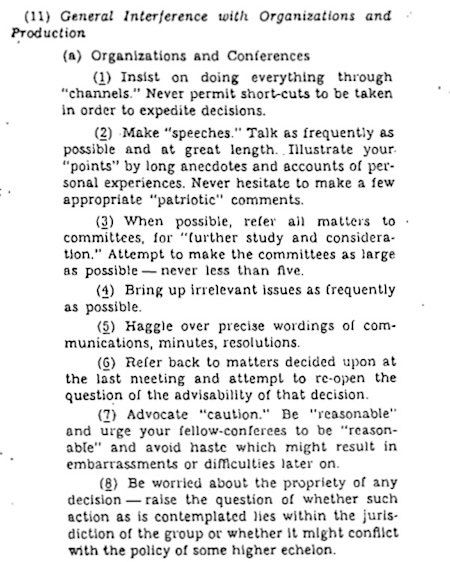

This statue doesn’t like dogs. Think we should topple it?
That statue hates dogs and should be torn down. pic.twitter.com/3gRvJs4Pj8
— Life on Earth (@planetpng) July 30, 2020

Support the Automatic Earth in virustime.








Home › Forums › Debt Rattle August 10 2020